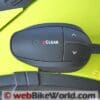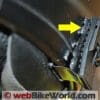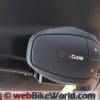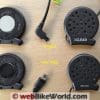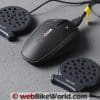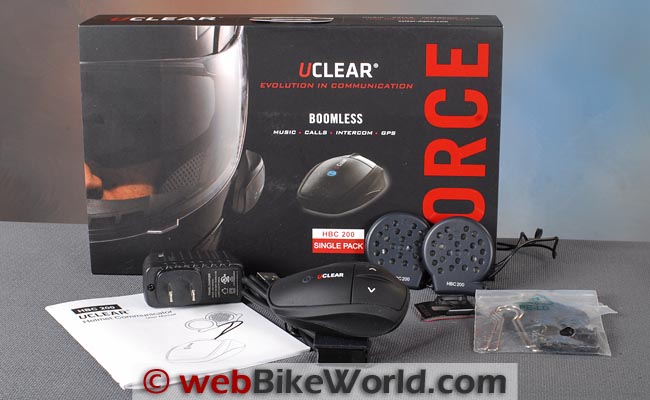Putting it all into perspective – the HBC200 remains the absolute champion regarding audio processing and intercom performance.
This is despite the fact that its effective intercom range of 700 to 800 meters is still outclassed by one or two other systems.
Not having to install and use a boom or thin-wire microphone is an absolute joy.
This removes another critical consideration or hurdle in adapting the HBC200 to a helmet, and the HBC220 (Snow) kit is equally as versatile for other outdoor activities.
If Multi-Hop technology truly provides the “force multiplier” in allowing intercom ranges in excess of one mile with ten plus users able to conference, then that is truly industry-leading performance that cannot be ignored.
Simply designed for specific functional and performance objectives, the UClear HBC200 delivers, in spades. What’s not to like?
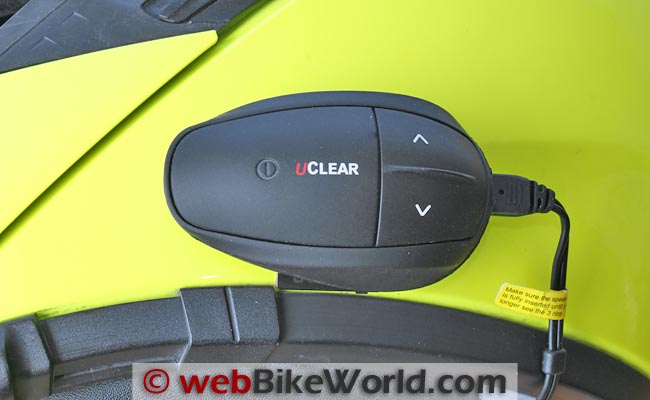
UClear HBC200 vs. HBC100 Revisited
The UClear HBC200 review Part 1 provided some interesting insight into the HBC200 system while also identifying the main differences between the original UClear HBC100 (review) series and the new HBC200 systems. One of my tasks for this follow-up was to provided additional insight into and between the two versions; what follows are some comparison and insight points.
Size and Shape
As can be seen in the photos, the HBC200 is larger than the original HBC100 module that had been the smallest Bluetooth unit we reviewed until the even smaller HuRob HSB S100 (review)intercom system was reviewed.
Outside of the HuRob, both UClear systems still have a smaller footprint than anything else except the Sena SMH5 (review) that is very close to the more stylized HBC200 model.
Helmet Fitment
Yes, the HBC200 uses the same simple lightweight mounting components as the HBC100. Why change something that, while perhaps not perfect, really works?
The modules have such a small footprint and presence that there is no need for a heavy-duty clamp or adhesive mount solutions. Changes? The HBC200 does have slightly heavier engagement points.
HBC200 Intercom Controls
The HBC200 retains the same three-button tactile control layout used on the HBC100 intercom, although the “skin” or covering is different and the external markings have changed and are a bit more stylish and positive in appearance.
With this elongated more aerodynamic shape, the individual control surfaces are much larger, with the Volume Up and Down pressure points defined by a raised molding.
The larger layout is much better than the original HBC100 with its smaller virtually flush controls that were indeed hard to operate with medium to heavy-weight gloves worn.
So while the controls are seemingly larger, don’t let all that real estate fool you; concise and positive pressure is needed; particularly critical for first-time, every-time activation of the main Answer button.
Using the front portion of the housing won’t do much other than resulting in a slightly mushy feel; a direct push on the UClear marking works every time.
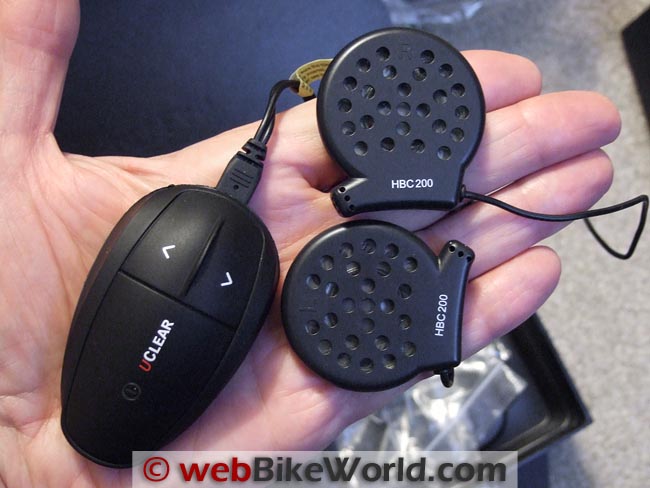
UClear HBC200 Headset
The Generation Two or G2 headsets provided with the HBC 200 kits subjectively seem to be better than the original units.
Although UClear has reiterated that volume output and audio quality is the same between the HBC100 and HBC200 series. But my ears still say the G2 units are better…
Wiring changes were made for the G2 headset, with the USB pin-out assignments changed so that power and data connections met the full USB standard; important given that the HBC200 is firmware upgradeable.
The newer G2 headsets are clearly marked with an “HBC200” stamp on the front of the speaker and a small “G2” on the back to identify the new head set, which also has a straight-line USB connector rather than the 90-degree connector used on the original set.
A minor physical change like this seems trivial, but in reality given various fitments vis-à-vishelmets, minimizing any overhang at the bottom of the helmet due to the angled connection and a desire to provide a straighter and more even grip when aligning and using the connector might be relevant.
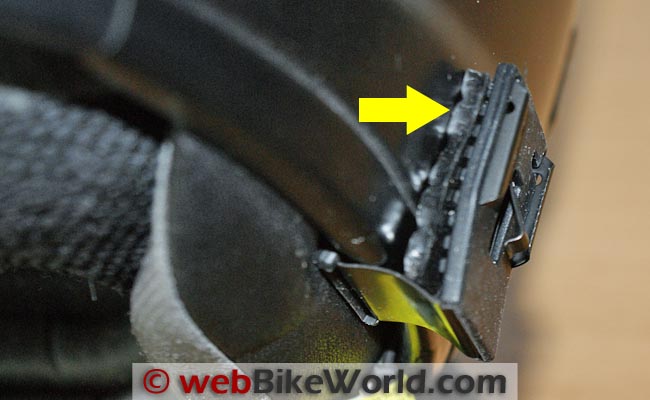
Comments on HBC200 Volume Levels
Regardless of whether there are any real differences in output between the Gen 1 and Gen 2 headsets, there is no denying overall system output, as validated by “Burn” during the Tork XPro Speakers and Mini Amplifier Review.
More UClear HBC200 Observations
Having now used the HBC200 with two open-face, two modular and three full-face helmets on the BMW R1200GS and one partially faired motorcycle, I’ve determined that there isn’t a lot of difference in overall intercom performance between helmets and motorcycles.
There are differences though — however minor — mainly due to the type of ear protection, helmet style, installation and cockpit environments of the two motorcycles.
But the system has a unique and extremely effective audio array and digital signal processing environment.
And with the occasional volume adjustment for individual audio sources, listening to music, answering incoming calls or conducting running intercom sessions is totally viable, even at high speeds on noisy thoroughfares.
The technology and system performance is just that good; only the new Vertix Raptor-i system (currently under evaluation) encroaches into UClear’s performance territory.
VOX
Although the voice activated feature isn’t highlighted in any way by UClear, it is there, working away discretely, less the odd hiccup when activation sensitivity seems to be a bit off, which is typically observed when using the intercom in quiet environments.
UClear acknowledges the issue and is addressing it for the forthcoming firmware release.
Echo and Feedback
The UClear HBC200 review Part 1 identified a background and feedback issue that can be heard.
And in having experienced it, to a degree, with the HBC100 series systems, it is something that can be present also with the HBC200 systems, although I have never found it obtrusive.
The “sweet spot” that forms in front of the user’s mouth by the unique “boomless” microphone system is extremely effective, but it can also pickup certain discrete sounds or noises, which are then passed along over the intercom, particularly when the users are not talking.
With extended use of the intercoms under varying riding conditions on different motorcycles, I discovered that the “sweet spot” zone will indeed pick up and amplify some sounds, like when shifting through the gears or adjusting gear.
The audio becomes an echo or feedback loop of sorts in that headset and heard as amplified audio in the receiving headset.
But by the same token, once speech is initiated by either party, the other sounds become distant or background or get filtered out completely by the UClear digital signal processing algorithms.
These issues are directly and indirectly related to the continued pre- and post-processing activities critical to maintaining a highly responsive audio environment.
UClear is aware of the issues and it is likely that tweaks or fixes will be made where possible…I like to think of it as “work in progress”.
Pairing
Not much to add from the positive results that “Burn” originally described, except that I probably have a few more Bluetooth-based peripherals on hand, and all of them work just fine with the HBC200, as they did with the HBC100 series.
Pairing with the HBC200 units is just plain fast and positive.
For communication options, added peripheral connectivity or audio sharing purposes the HBC200 is a great partner with the UClear WT300 (review) and Sena SR10 Bluetooth Adapters (review).
And also the Sena SM10 (review) Dual Stream Bluetooth Stereo Transmitter (Audio Sharing) device.
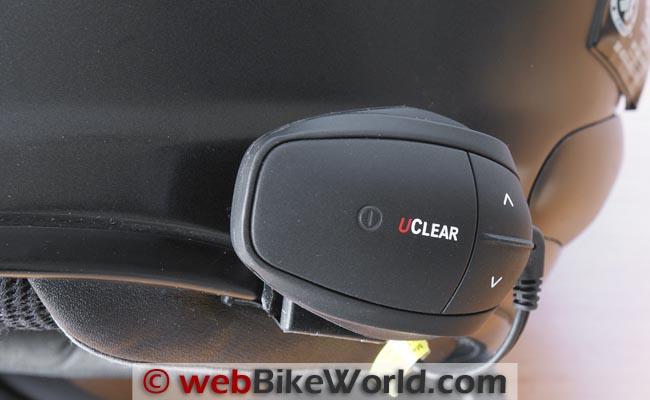
Multi-Hop Technology Applied
Completely new with the HBC200 is the advanced Multi-Hop technology that goes beyond — well beyond — the typical two, three or four-party intercom conferencing provided by most modern Bluetooth helmet systems.
How about a chain of ten or more users, over (very) long distances?
While the technology and processes used are complex, from a communications perspective they are also quite mature; but as applied in a consumer-oriented motorcycle intercom system it is both innovative and unique…at least for now.
Simply stated, “Large Group” or “Super Group” intercom operations with the HBC200 system can consist of 10 or more HBC200 units formed into a “daisy-chain” or serial network through iterative pairings.
This creates an extended distance multi-party conferencing capability. This is based on the standard intercom range between two units plus the Multi-Hop technology.
So what happens when Multi-Hop and serial pairing is brought together?
Well, depending on the number of paired HBC200 systems in use — each of which work as a repeater or relay point — overall intercom range is significantly extended between two or any number of parties in the chain.
A typical scenario, described by UClear, involves four users.
Adding (or multiplying), the individual standard intercom range by three (A to B range, B to C range, and C to D range) brings about a calculated range of 2,100 metres or 1.3 miles!
In theory, a Super Group chain of even more users could bring about even more range.
Unfortunately until we manage to get enough compatible units together (how about a multi-system loan UClear?), we’ll have to accept that everything works as claimed.
Although you don’t have to convince me — I’ve seen and used similar technology effectively, with outstanding results, in a previous career. .
Firmware Updates
As the HBC200 is now firmware-upgradeable (v0.93 is the initial release provided with the systems), we have been anxiously waiting for the first release, which UClear hopes to have ready for April 2013.
This initial release may include fixes for reduced echo in the rider/passenger intercom configuration, sensitivity adjustments or on/off transition for VOX processing.
And reducing the “open channel” time delay when initiating an intercom session; all issues noted during our evaluations and many other HBC200 owners.
Another possible enhancement would benefit large-group or multi-party intercom sessions that the HBC200 supports, resulting in more effective management of these sessions.
With the request made, we can hope that UClear will indeed provide us with the firmware early, so it can be given a thorough test-ride — stay tuned…
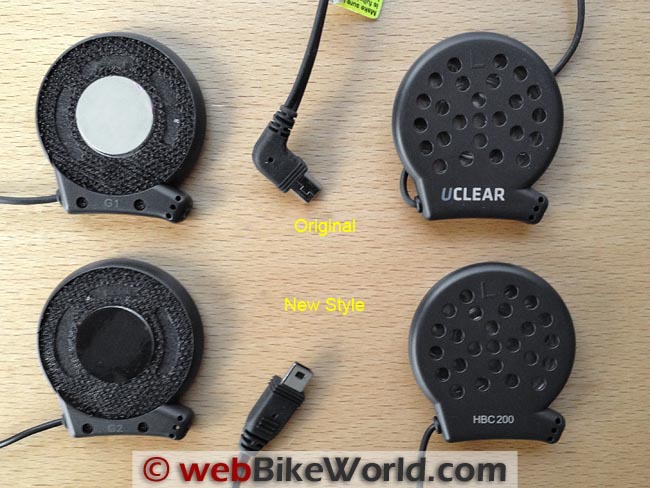
On the Road: Function and Performance
The Editor and “Burn” had limited time with the HBC200 intercom systems, but the new UClear units obviously left a positive impression as reflected in Part 1.
Fortunate enough to inherit the systems for this Part 2 review, I’ve been able to acquire more saddle time under varying riding conditions with different helmets on different motorcycles.
Riding time in Virginia in December and again this March, mixed in with our periodic warm breaks at home in Canada have definitely allowed me to validate my positive first impressions of the HBC200 systems.
The unique form factor of the UClear headset remains — as does simplicity and ease of use — but it seems performance is better. My imagination? Perhaps…
Turning on the set, then waiting for a few seconds before pushing the “Up” volume control initiates the intercom.
This is sometimes indicated by just a slight bit of white noise or “presence” in the headset, due to the sensitivity of the detection system in the helmets.
And while this observation is not a negative in any sense, one has to appreciate that noise made by the other users that don’t typically get detected by other systems come through loud and clear.
Remember the “you could hear a pin drop” expression? That about sums it up.
As the road, motorcycle and environmental noise builds, the system adjusts almost instantly in filtering out everything unwanted, creating a face-to-face conversation capability via the intercom, no matter the distance involved.
As with the original HBC100 series units, taking a phone call or initiating one (when stopped of course) always results in having to convince the caller that I’m actually out riding, sometimes at speed.
But they don’t know that; nothing gets processed out but my voice.
Switching between audio sources is (for the most part) seamless (requires no button pushes) and once any higher priority activities are finished the stereo stream resumes within a second or two with outstanding stereo audio from the headset.
I only have one real issue that might (hopefully) be addressed via a firmware fix or provided as a setting choice.
When riding alone and monitoring the phone without any audio streaming, so as to enjoy the relative peace and quiet and the riding experience, the system (still) shuts down after 60 minutes, even though there is an existing Bluetooth link.
Battery life seems to be on par with that achieved with the HBC100 units, so one or two days of light use is possible, although steady audio streaming and intercom sessions will probably see the units needing recharging daily for best performance.
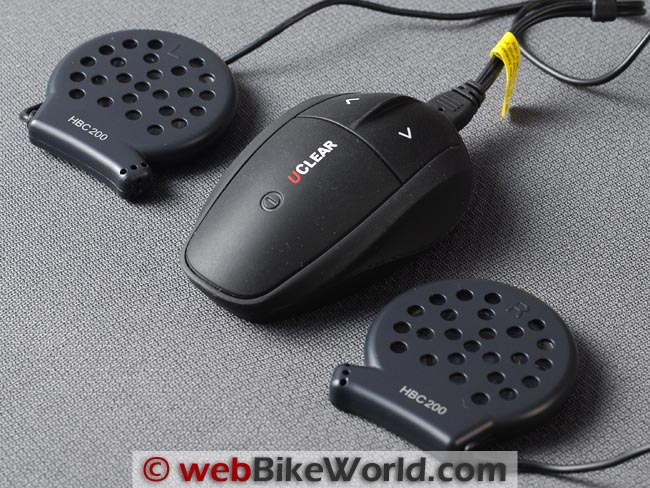
|
webBikeWorld Overall Opinionator: UClear HBC200 Intercom
|
|
|---|---|
| Picks… | …and Pans |
|
|
Final Conclusion
Having used the UClear HBC100 (review) and HBC120 systems ever since they arrived on the market, and now well into what I expect will be a long-term relationship with the HBC200 systems, my observations are summarized in the table above.
Putting it all into perspective, the UClear HBC200 remains the absolute champion regarding audio processing and intercom performance.
Aacknowledging that its effective intercom range of 700 to 800 metres is still outclassed by one or two other motorcycle intercom systems.
And relatedly, if Multi-Hop truly provides the “force multiplier” in allowing intercom ranges in excess of one mile, then that is truly industry-leading performance that cannot be ignored.
The HBC100 — and now the HBC200 — for their simplicity of design and function and performance achievements cannot be ignored and a Five Star rating is truly deserved. I’m looking forward to what comes next…
|
wBW Review: UClear HBC200 Intercom
|
|
|---|---|
| Manufacturer: UClear Digital | List Price: $449.95 (Dual Pack) |
| Colors: Black. | Made In: Singapore |
| Size: N/A | Review Date: December 2012 |
Owner Comments and Feedback
See details on submitting comments.
From “M.A.” (April 2013): “I bought a pair of these for my girlfriend and I, and we like them. That being said, they’re very sensitive to positioning in the helmet, and getting it wrong can mean that the intercom is very quiet.
One thing I would like to caution everyone about is their incompatibility with the Interphone Dual Stereo Bluetooth Transmitter. I bought one of these hoping to save a few bucks over the Sena SM10 (review), and unfortunately I couldn’t get it to work, even with help from uClear support.
It does stream audio to the uClear devices, but somehow locks them out of switching to intercom mode.
They suggested the Sena SM10 you use in your review, and I’m inclined to believe it’s a problem on the Interphone transmitter. Hopefully I can find some other use for it.”


